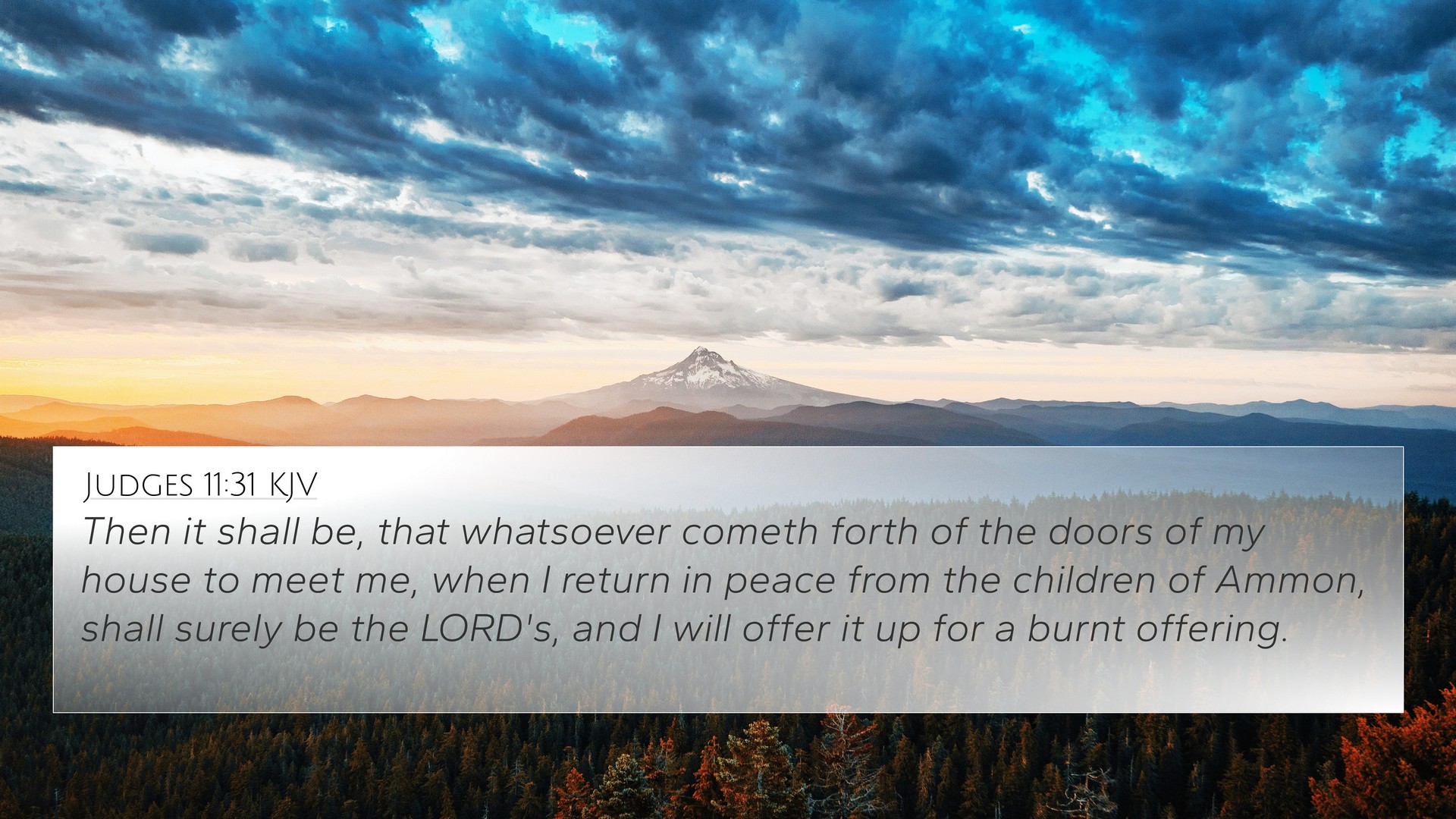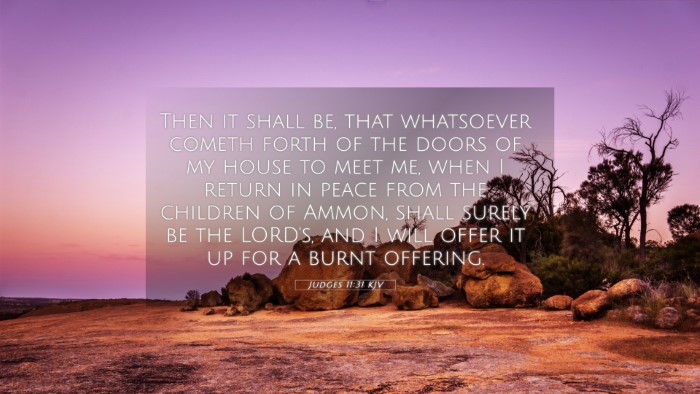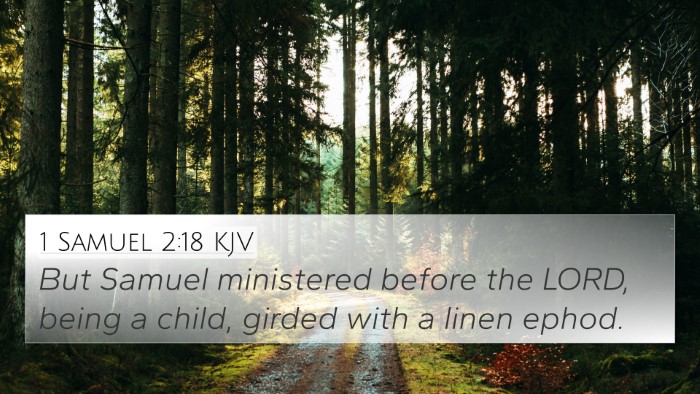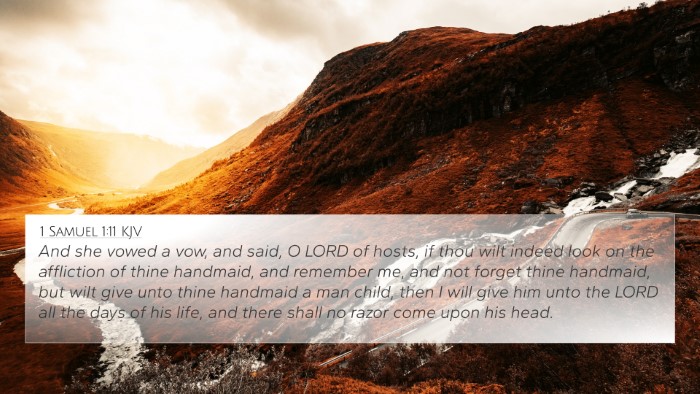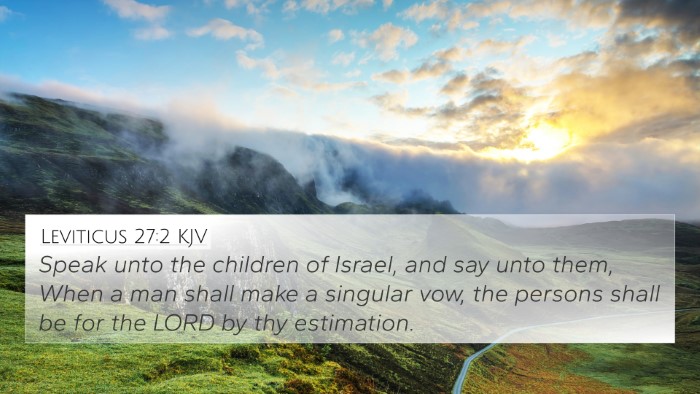Understanding Judges 11:31
Judges 11:31 states: "Then it shall be that whatever comes out of the doors of my house to meet me, when I return in peace from the children of Ammon, shall surely be the Lord's, and I will offer it up as a burnt offering." This verse carries significant weight and is often discussed in terms of its implications and theological meaning. Below is a detailed exploration of its interpretations, enriched by insights from public domain commentaries.
Contextual Background
This verse is situated in a dramatic narrative where Jephthah, a judge of Israel, is confronted with the Spirit of the Lord and embarks on a battle against the Ammonites. His vow to the Lord reveals much about his character, faith, and the culture of the time.
Commentary Insights
-
Matthew Henry:
Henry emphasizes the rashness of Jephthah's vow. He notes that while the intention might have been devout, the actual outcome reveals a lack of foresight. The tragedy of Jephthah's situation raises questions about human vows and their implications for obedience to God.
-
Albert Barnes:
Barnes points out the cultural practices surrounding vows in ancient Israel. He highlights the seriousness of Jephthah's commitment and warns readers about the gravity of making hasty promises to the Lord. He connects this incident with the broader theme of dedication and sacrifice in the Old Testament.
-
Adam Clarke:
Clarke's analysis delves into the nature of Jephthah's vow. He speculates on the possible implications—whether Jephthah intended to sacrifice his daughter literally or in a different manner—thus opening a discussion on the interpretation of vows in a theological context.
Theological Implications
The essence of Judges 11:31 serves as a cautionary tale regarding the nature of vows and the prioritization of divine instruction over personal desires. Jephthah's commitment challenges readers to reflect on their own promises to God and the importance of thoughtful consideration in one's spiritual commitments.
Bible Verse Cross-References
To form a deeper understanding of Judges 11:31, it is helpful to cross-reference with other biblical verses. Here are some key cross-references that relate to this theme:
- Numbers 30:2: Discusses the seriousness of making vows to the Lord.
- Leviticus 27:28-29: Covers the laws concerning vows and sacrifices, providing guidelines for what is acceptable to God.
- 1 Samuel 1:11: Hannah makes a vow to the Lord, showcasing the significance of vows in a personal religious context.
- Matthew 5:33-37: Jesus speaks about the importance of fulfilling vows, emphasizing integrity in promises.
- Ecclesiastes 5:4-5: Advises against making rash vows, indicating the weight of accountability before God.
- Hebrews 11:32-33: Provides insight into the faith of Old Testament figures, including Jephthah, enriching the understanding of his character.
- Romans 12:1: Presents the concept of presenting oneself as a living sacrifice, drawing parallels to Jephthah's vow as a sacrifice to the Lord.
Connecting Themes
This verse encapsulates several interconnected themes prevalent in the Bible, such as:
- Faith and Commitment: Examining how faith influences the actions and decisions of biblical figures.
- Consequences of Vows: Understanding the impact of promises made to God and the realities they can create.
- Sacrifice as Worship: Reflecting on the nature of sacrificial offerings and their significance in one's relationship with God.
Practical Applications
Readers can draw several practical applications from Judges 11:31, including:
- Thoughtfulness in Promises: Emphasizing careful consideration before making vows, particularly spiritual commitments.
- Understanding Sacrifice: A call to recognize what it means to dedicate oneself to God genuinely.
- Seeking Guidance: Encouraging prayer and reflection on what God desires rather than acting on impulse.
Conclusion
Judges 11:31 presents a multifaceted verse encouraging readers to deeply consider the nature of vows and commitments made to God. Through careful study, cross-referencing, and thematic exploration, one can uncover the profound implications of this tragic yet enlightening narrative. This approach not only enriches one's understanding of the text but also fosters spiritual growth through mindful living and commitment.
Exploring Further
For those seeking to deepen their study of the Bible, utilizing tools for Bible cross-referencing can provide rich insights into similar themes, narratives, and theological lessons across scripture. Implementing a systematic approach to Bible study with an emphasis on inter-Biblical dialogue can reveal further connections between various biblical texts and enhance one’s faith journey.
